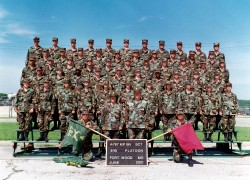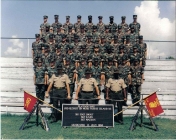Specialty Summary. Deploys, sustains troubleshoots and repairs voice, data and video network infrastructure and cryptographic equipment in a fixed and deployed environment. Sustains and operates systems through effective troubleshooting, repair, diagnostics and system performance analysis.
Duties and Responsibilities:
Plans, organizes and directs sustainment activities. Establishes work standards, methods and controls for preventative, scheduled, and unscheduled maintenance actions. Determines extent and economy of repair of malfunctioning equipment. Ensures compliance with technical data, instructions, and work standards. Interprets malfunctions and prescribes corrective action. Serves on, or directs inspection teams organized to evaluate base or command sustainment programs. Manages, or performs research and development projects for assigned systems.
Reviews technical instructions, plans, and installation drawings to install systems. Ensures conformance to standard installation practices. Plans and schedules communications and related equipment installations. Resolves installation and maintenance discrepancies using applicable directives, diagrams and installation systems records. Inventories project and work order materials. Initiates and conducts system verification tests to assess the capability and effectiveness of networks and communications systems.
Maintains, inspects and tests assigned systems. Coordinates with commercial service providers and depots to conduct tests of system components and assemblies to isolate faults. Removes, repairs, replaces and restores systems or subsystems.
Performs organizational, intermediate and depot level sustainment on assigned systems. Establishes priorities and schedules repair actions. Isolates malfunctions using troubleshooting techniques, diagnostic software, technical data, block diagrams, voltage and waveform measurements, and other tests requiring specialized test equipment. Repairs computer network systems and associated peripheral equipment. Test components using bench mockups and related test equipment. Aligns and modifies system components according to National Security Agency, Joint, Departmental, DISA Directives, technical data, Time Compliance Technical Orders (TCTO) and local procedures. Evaluates and recommends methods to improve system or equipment performance and sustainment procedures.
Documents inspection and maintenance actions. Establishes and maintains systems configuration records. Monitors and documents systems performance.
Ensures compliance with operation security practices. Applies communications security programs to include physical, cryptographic, transmission, and emission security. Develops and ensures compliance with safety standards and instructions.
Performs pre-deployment operations and mobilization of theater deployable communications systems for transport by air, land or sea. Deploys systems and support equipment to support mission requirements. Establishes maintenance management procedures and agile logistics support channels to sustain continuous network operations. Coordinates and assists end users in isolating and eliminating communications connectivity problems. Removes, repairs and replaces assemblies, subassemblies and electronic components to optimally sustain communications networks. Prepare systems for redeployment and equipment regeneration.
Specialty Qualifications:
Knowledge. Knowledge of the following is mandatory: fundamentals of electronics; digital theory; fundamentals of computer and network systems; network topologies and protocols; cryptographic techniques and equipment configuration; and communication and switching systems principles of operations and technologies. Also, knowledge of basic troubleshooting procedures, operation and use of test equipment; use of technical data, wiring diagrams, and schematic drawings; and the structure and use of the Air Force supply system is mandatory.
Education. For entry into this specialty, completion of high school with courses in computers and mathematics is desirable.
Training. For award of AFSC 2E231, completion of Network Infrastructure Systems course is mandatory. To sustain cryptographic equipment, completion of training according to AFI 21-109, Communications Security, Equipment Maintenance and Maintenance Training is mandatory.
Experience. The following are mandatory for award of the AFSC indicated:
2E251. Qualification in and possession of 2E231. Experience in functions such as deploying, sustaining, modifying, troubleshooting and repairing of voice, data and video network infrastructure and cryptographic equipment.
2E271. Qualification in and possession of 2E251. Experience in performing or supervising functions such as deploying, sustaining, modifying, troubleshooting and repairing voice, data and video network infrastructure and cryptographic equipment.
Other. The following are mandatory as indicated: For entry into this specialty: Normal color vision as defined in AFI 48-123, Medical Examinations and Standards. Qualification to operate a government vehicle according to AFI 24-301, Vehicle Operations. Specialty requires routine access to Top Secret material or similar environment. For award and retention of AFSCs 2E2X1, completion of a current Single Scope Background Investigation (SSBI) according to AFI 31-501, Personnel Security Program Management. NOTE: Award of the 3-skill level without a completed SSBI is authorized provided an interim Top Secret clearance has been granted according to AFI 31-501.




